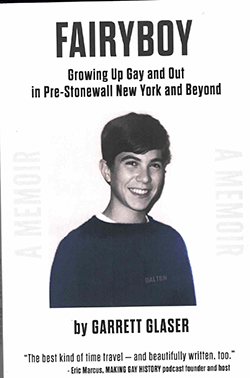Fairyboy: Growing Up Gay and Out in Pre-Stonewell New York and Beyond by Garrett Glaser; independently published; © 2025; ISBN 9798316-580682; 256 pages; $19.95.

 SAN DIEGO – Author Garrett Glaser, now retired in San Diego, had a long career in journalism. The last two decades were spent from 1986 through 1988 at Channel 7 (WABC) in New York; 1989 through 1993 as the National Correspondent of Entertainment Tonight; 1993 through 1995 as a media/ entertainment anchor at KNBC in Los Angeles; and 1997 through his retirement in 2005 as a New York-based business news correspondent for CNBC.
SAN DIEGO – Author Garrett Glaser, now retired in San Diego, had a long career in journalism. The last two decades were spent from 1986 through 1988 at Channel 7 (WABC) in New York; 1989 through 1993 as the National Correspondent of Entertainment Tonight; 1993 through 1995 as a media/ entertainment anchor at KNBC in Los Angeles; and 1997 through his retirement in 2005 as a New York-based business news correspondent for CNBC.
Glaser believes he was the first on-air news personality to publicly identify as gay, commenting during a 1994 broadcast on KNBC: “As a gay man who’s lost more than a few friends to the virus, I am grateful to Elizabeth Glaser [no relation] for helping to heighten awareness of AIDS outside the ga and lesbian community.”
Elizabeth Glaser, founder of the Pediatric AIDS Foundation, had died that same day.
Garrett Glaser had not been closeted before his announcement on live television. Prior to “outing” himself before a large television audience, he served for four years on the board of the Gay/ Lesbian Alliance Against Defamation (GLAAD/ LA). In 1992, at the convention of the Radio and Television News Directors’ Association, he began his remarks by saying “We’ve been in the shadows too long.”
But to the general television viewing public, these facts thus far had been unknown.
More than 30 years before, as a Jewish 9-year-old, he was invited by a Christian friend to come swimming at a country club in Scotch Plains, New Jersey. The friend’s father asked Garrett not to swim in the pool because Jews were not allowed at the country club.
“I wonder now whether Kevin’s father’s admonition about saying out of the pool at the country club because I was Jewish prime me to avoid the closet once I realized I was homosexual. When I came out in my early teen years, I knew I didn’t want to be forced to hide any part of my identity. Ever.” Glaser writes.
That disappointingly was the only reflection on being gay and Jewish. No essays on his reaction to the treatment accorded the LGBTQ community by the various Jewish religious movements. Neither did Glaser write about the Left-Wing LGBTQ anti-Israel crowd who refuse to permit gay Jews to participate at their various protests—an irony because Israel is a gay-friendly nation, whereas several Muslim countries kill or beat suspected homosexuals.
What Glaser did write about is how American gays felt liberated following the 1969 Stonewall riots, in which he participated the second night but not the trailblazing first night. And he wrote how the danger of dying from AIDS changed some sexual practices among gay men.
Another section of his memoir dealt with famous news stories he covered. Particularly notable were a prison interview he conducted in California with mass killer Charles Manson. He also covered the 9-11 terrorist attacks on New York City while he was affiliated with CNBC.
All in all, this memoir provides some interesting reading.
*
Donald H. Harrison is publisher and editor of San Diego Jewish World.